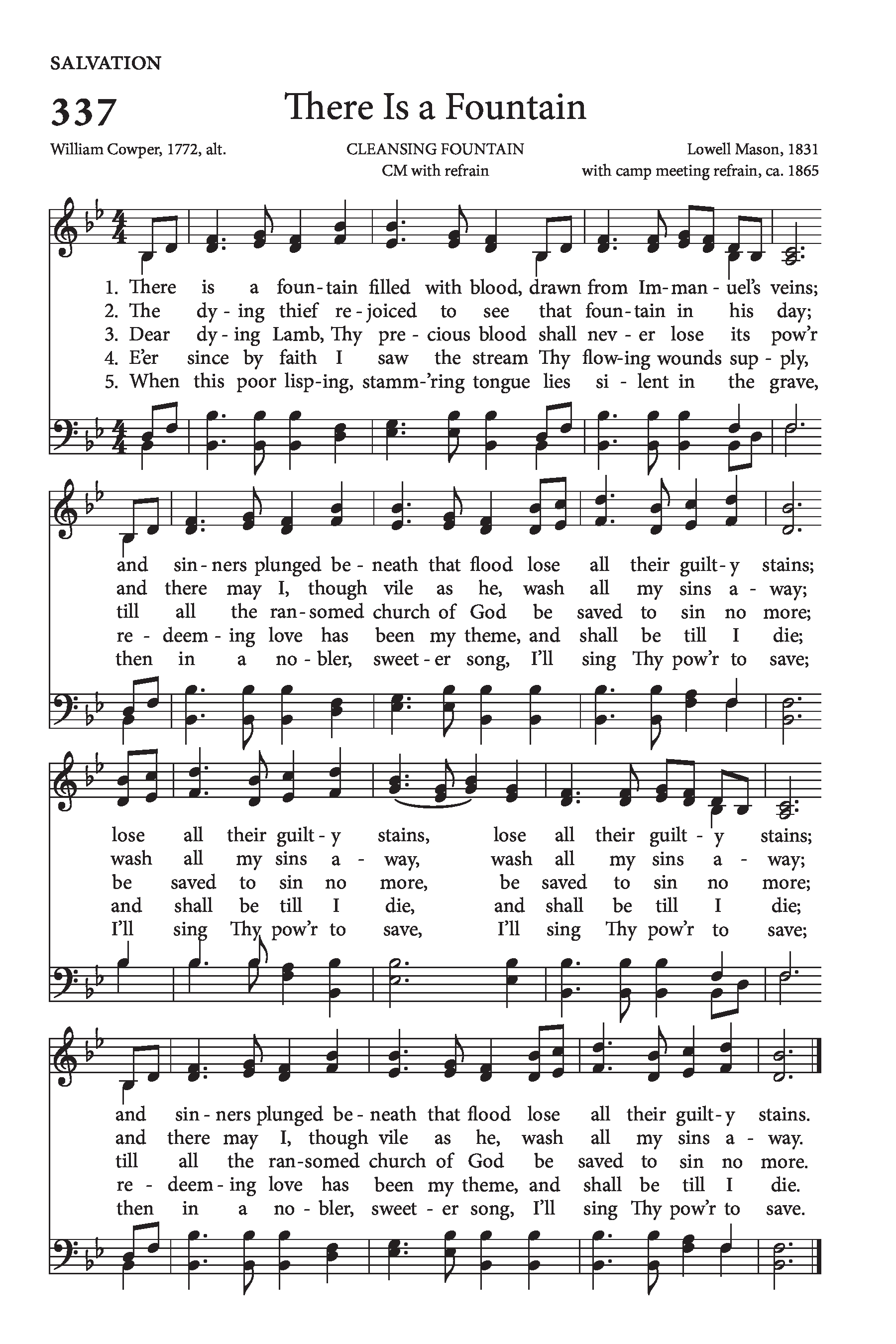There Is a Fountain Filled with Blood
Lyrics
Drawn from Immanuel's veins;
And sinners, plunged beneath that flood,
Lose all their guilty stains:
Lose all their guilty stains,
Lose all their guilty stains;
And sinners, plunged beneath that flood,
Lose all their guilty stains.
That fountain in his day;
And there may I, though vile as he,
Wash all my sins away:
Wash all my sins away,
Wash all my sins away;
And there may I, though vile as he,
Wash all my sins away.
Shall never lose its pow'r,
Till all the ransomed Church of God
Be saved, to sin no more:
Be saved, to sin no more,
Be saved, to sin no more;
Till all the ransomed Church of God
Be saved to sin no more.
Thy flowing wounds supply,
Redeeming love has been my theme,
And shall be till I die:
And shall be till I die,
And shall be till I die;
Redeeming love has been my theme,
And shall be till I die.
Lies silent in the grave,
Then in a nobler, sweeter song
I'll sing Thy pow'r to save:
I'll sing Thy pow'r to save,
I'll sing Thy pow'r to save;
Then in a nobler, sweeter song
I'll sing Thy pow'r to save.
Bible Reference
Zachariah 13:1
About This Hymn
Author – William Cowper, 1731–1800
Music – American Melody
Tune Name – “Cleansing Fountain”
Meter – 86.86.66.86
Scripture Reference – Zechariah 13:1
“But now in Christ Jesus ye who sometimes were far off are made nigh by the blood of Christ.” – Ephesians 2:13
William Cowper (pronounced “Kooper”) stands as one of England’s most revered literary figures, esteemed as the finest poet between Alexander Pope and Percy Bysshe Shelley. His contribution to English literature includes a celebrated translation of Homer, his widely appreciated poem collection The Task, and the humorous narrative The Diverting History of John Gilpin. Yet, it is perhaps in the realm of sacred verse that Cowper’s influence has been most enduring, especially through hymns that continue to bless worshipers around the world.
Born on November 15, 1731, in Great Berkhamstead, England, Cowper was the son of an Anglican clergyman. His mother, from a family of royal lineage, died when William was just six years old—a loss that left a deep emotional wound. Cowper later confessed that there had not been a single day in his life when he did not mourn her absence. Frail in body and sensitive in spirit, he struggled with severe depression throughout his life. Trained in law under his father’s guidance, Cowper was never able to fully embrace a legal career. The pressure of appearing for his final bar examination caused a mental collapse, leading to an attempted suicide and a prolonged stay in an asylum.
It was during his time of confinement that Cowper encountered the transforming power of Scripture. Reading Romans 3:25, he came to understand the redeeming work of Christ and found peace in God’s forgiveness. His conversion in 1764 marked the beginning of a new chapter in his life, though his battle with mental anguish never entirely ceased. After his recovery, he formed a lasting friendship with the Unwin family, especially with Mrs. Mary Unwin, who remained a loyal companion and spiritual support for the remainder of his life.
In 1767, following the death of Rev. Morley Unwin, the family moved to Olney, England, where they became closely associated with John Newton, the former slave trader turned Anglican minister and hymn writer. Newton recognized Cowper’s poetic gifts and encouraged him to join in a collaborative project that became the Olney Hymns, published in 1779. Of the 349 hymns included, 67 were written by Cowper. Among them is the beloved hymn “There Is a Fountain Filled with Blood,” originally titled “Peace for the Fountain Opened.”
This powerful text is rooted in Zechariah 13:1, which speaks of a fountain opened “for sin and for uncleanness.” Cowper’s verses vividly portray the cleansing power of Christ’s atonement, offering hope to sinners in every age. Its enduring influence is seen in the countless lives transformed through its message of grace and redemption. The tune most commonly associated with this hymn, “Cleansing Fountain,” is derived from an American folk melody likely heard in early nineteenth-century camp meetings, adding a rustic sincerity to Cowper’s heartfelt poetry.
Despite the ongoing shadow of melancholy, Cowper remained productive. Some of his deepest spiritual expressions came during his darkest hours. Although he often feared he had been abandoned by God, his final moments spoke otherwise. As death approached in 1800, those attending him reported that his face shone with peace, and he softly declared, “I am not shut out of heaven after all.”
William Cowper’s legacy is one of poetic brilliance wedded to heartfelt faith. Though afflicted by personal sorrow and inner turmoil, he gave the Church hymns that continue to lift hearts toward heaven, reminding believers that the fountain of Christ’s blood still flows with mercy and cleansing for all who come.
Ask ChatGPT


📬 Subscribe to Our Devotional Updates
Receive weekly hymns, devotionals, and website features directly in your inbox.
Hymn Information

- Category: Hymn
- Author/Writer: William Cowper (1772)
- Added: July 11, 2025
- Last Updated: July 11, 2025
- Views: 1438
To view the author's biography, click their name above.
MIDI File
Hymns from 1772
Popular Hymns
Recent Blog Posts
Popular Blog Posts
Visit Us on Social Media
Latest from X (Twitter)
Tweets by HymnalLibraryLatest from Facebook
Latest on YouTube
Daily Bible Verse
Disclaimer
The hymns, sheet music, MIDI files, and related content on this website are provided for educational and research purposes only.
- Public Domain: Many of the hymns featured here are in the public domain and may be freely used.
- Copyrighted Works: Some hymns may still be under copyright protection. Where applicable, permission has either been requested from the copyright owner, or the content is shared under the principles of fair use for educational purposes.
⚠️ Important Notice: If you wish to reproduce, distribute, or use any copyrighted hymn beyond personal study or educational use, you must obtain permission directly from the copyright holder. This website does not grant any rights for commercial use yet.
If there is any other question please address it to us in our Contact Page, for further assistance. Thank you for using the site. May God Bless You.














 William Cowper (1731–1800) was an English poet and hymn writer whose work has had lasting influence in both Christian worship and English literature. Born in Berkhamsted, Hertfordshire, England, Cowper was the son of an Anglican clergyman who served as chaplain to King George II and grew up with strong religious influences. He was educated at Westminster School and later studied law, but he never practiced due to recurring struggles with depression and anxiety that affected much of his adult life. These struggles led to periods of deep spiritual questioning and emotional turmoil, which in turn shaped the tone of many of his hymns and poems.
William Cowper (1731–1800) was an English poet and hymn writer whose work has had lasting influence in both Christian worship and English literature. Born in Berkhamsted, Hertfordshire, England, Cowper was the son of an Anglican clergyman who served as chaplain to King George II and grew up with strong religious influences. He was educated at Westminster School and later studied law, but he never practiced due to recurring struggles with depression and anxiety that affected much of his adult life. These struggles led to periods of deep spiritual questioning and emotional turmoil, which in turn shaped the tone of many of his hymns and poems.